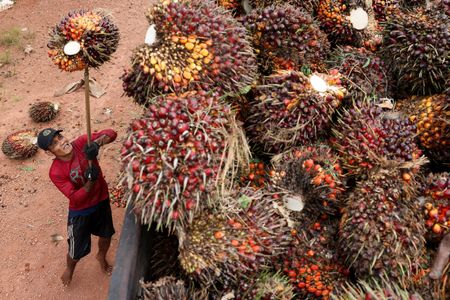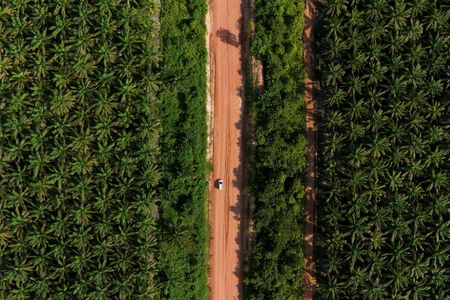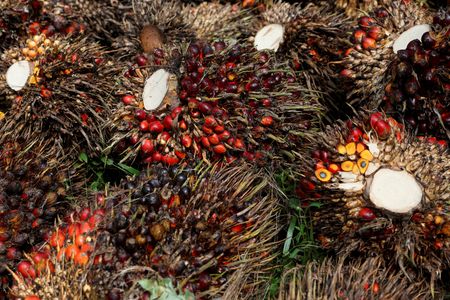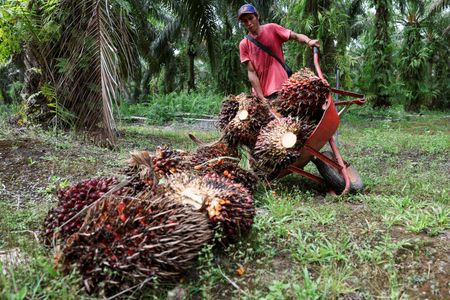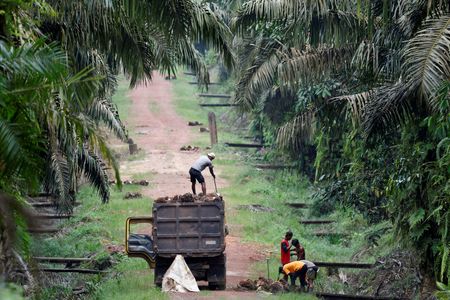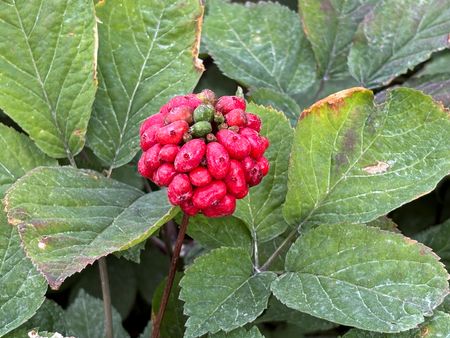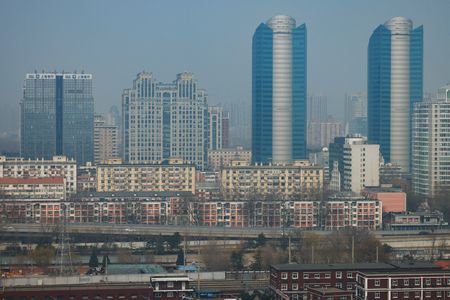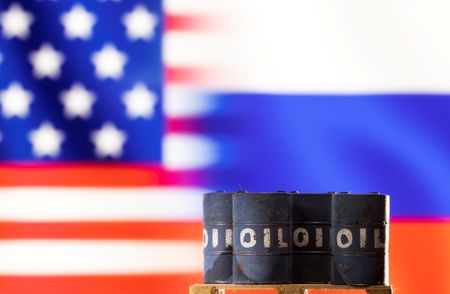By Gayatri Suroyo and Bernadette Christina
SAMPIT, Indonesia (Reuters) -Indonesian soldiers in fatigues marched onto a private palm oil plantation on Borneo island in late June and posted a signboard declaring the estate under government control, its managers said.
The scene at the Melati Hanjalipan plantation exemplifies a sweeping military-backed takeover that has sent a chill through the world’s biggest palm oil producer and its 16-million-strong workforce.
Around 3.7 million hectares (9.1 million acres) of plantations have been seized, with nearly half transferred to nascent state firm Agrinas Palma Nusantara, catapulting it into the world’s largest palm oil company by land size.
The crackdown ordered by President Prabowo Subianto is the biggest structural change in Indonesia’s palm industry and has brought a total of 5 million hectares under military scrutiny. That is about 30% of the country’s total palm oil acreage and an area bigger than the Netherlands.
The territory could eventually be handed to Agrinas, a company industry experts say is ill-equipped to manage it.
The president’s office and Agrinas did not respond to Reuters requests for comment.
“We are determined that there will be no more corruption cases that cannot be investigated, no more untouchables,” Prabowo told his cabinet on Monday while listing the seizures as one of his most notable achievements since coming to power in October 2024.
COMPANIES UNDER SIEGE
Prabowo, a former special forces commander, has widened the military’s role in civic affairs, reviving fears of a return to Indonesia’s Suharto-era authoritarianism.
He has installed retired generals on Agrinas’ board and formed a task force of soldiers, police and prosecutors to target plantations operating inside areas designated as forest, a January presidential decree and the company’s website showed.
The task force, Indonesia’s defence ministry and the military did not respond to questions about the seizures.
Reuters interviews with a dozen company executives and growers across Indonesia and five industry watchers, including the sector’s most‑followed analysts, found widespread fear about their future operations and the impact of the crackdown on global supply.
For the first time, sources at three of Indonesia’s top palm oil producers said they have scaled back fertiliser use and routine upkeep in areas at risk of takeover – steps that can depress yields for seasons to come.
No company has publicly questioned the seizures or the formation of Agrinas and the executives requested anonymity for fear of government retaliation.
“If the government uses the military, the police, what can a company do? Who do we protest to? Do you think we dare?” one executive said.
The stakes are high for Indonesia, which accounts for over half the world’s production of palm oil and exports nearly $30 billion worth of the commodity annually, used in products from snacks and cosmetics to fuel and cooking oil.
Before the crackdown, industry group GAPKI predicted a slight rise in 2025 output to 53.63 million tons, but chairman Eddy Martono said the “uncertainty could lead to a decline” as early as late this year.
‘KING OF THIEVES’
The drive to Melati Hanjalipan takes two hours from the town of Sampit through remote terrain where mobile reception fades and red dust clouds follow passing trucks.
The 106-hectare plantation faces an uncertain future under state control, with monthly fresh fruit bunches output already plummeting to 23 metric tons from a typical 80-100 tons, cooperative head Sabarani told Reuters.
He explained their caretaker partner was reluctant to maintain the plot due to its disputed legal status.
“Why is the state becoming the king of thieves?” he asked.
Sabarani acknowledged managing the plot — originally cleared for timber by a Dutch company — for two decades without proper papers. His cooperative once had a local government permit that expired, and when the central government reclassified the area as forest, they failed to secure a new Forest Area Utilisation Permit.
That mirrors the experience of many smallholders who initially began planting on ancestral lands before being told they were encroaching on forests.
Seizures have also hit tens of thousands of small plantations run by transmigrant farmers resettled under the government of former strongman leader Suharto, an association representing them said.
“We don’t want to join Agrinas without legality,” Sabarani said. “We don’t want to be used as a tool to work for them but still be left illegal.”
MILITARY-RUN PLANTATIONS
Prabowo has framed the push as essential to deliver food and energy self‑sufficiency within five years.
Agrinas is tasked with achieving his ambition of producing diesel entirely made of palm oil and controlling at least 30% of the domestic cooking oil market.
Formed in January and helmed by Agus Sutomo, an ex-special forces commander who campaigned for Prabowo, Agrinas was handed the palm brief in March with no previous experience.
That month, armed troops arrived at plantations managed by Duta Palma Group, the target of an ongoing money-laundering case, the company’s lawyer said, showing pictures and videos. The lands were transferred to Agrinas.
By September, it was overseeing 1.5 million hectares and Sutomo said it aims to manage 3 million by 2029.
“My job used to be running around, go undercover, but now I’m ordered to take care of palm oil,” he told parliament in September.
“This is a mandate, an honour, even though I don’t know anything.”
INDUSTRY’S BIGGEST NAMES
The task force has cast its eyes on some of the industry’s biggest names. Subsidiaries of Singapore-based Wilmar, SD Guthrie, Sinar Mas Group, Musim Mas Group, First Resources and Cargill were listed by the forestry ministry as having illegal operations in forests.
Wilmar reported a 5% increase in first-half fresh fruit bunches production despite difficulties but said full‑year results depend on “resolution of various issues” with Indonesian authorities.
The company told Reuters it was engaging with Agrinas on a few plantations and supports the regulation of illegal plantations.
Cargill said it was aware of ongoing reviews and was in constructive dialogue with authorities.
SD Guthrie did not respond to requests for comment but in August said 3% of its planted area was affected. First Resources and Musim Mas declined to comment. Golden Agri, the parent company of Sinar Mas, did not respond.
COMPLEX LEGAL MAZE
The seizures spotlight decades of murky land legality. Since a boom in the 1990s, Indonesia’s palm oil sector has been dogged by deforestation, unclear land rights, shifting rules and inconsistent enforcement.
Three senior executives said many growers hold documents Jakarta disputes and face opaque processes to regularise permits.
Even sustainably certified companies are under scrutiny, deepening investor concern.
The result could be a multi‑year drag on output, particularly as growth has already slowed due to ageing trees and a moratorium on new permits in primary forest.
GLOBAL STAKES
A significant production shortfall would reverberate through global edible oil markets, already tight as Jakarta channels more palm to biodiesel.
Defence Minister Sjafrie Sjamsoeddin, who leads the task force, has said Agrinas “must be ready to make sure production will not drop, and should even be increased.”
But at an industry conference in Mumbai, top analysts warned of declines if seizures continue.
“We are assuming Indonesia’s production will rise by 0.7 million tons next year, but I would not be surprised if the expansion turns out to be much smaller, since investments are being reduced,” said Thomas Mielke of forecaster Oil World.
Industry analyst Dorab Mistry echoed those concerns: “The threat of nationalisation immediately leads to lower yields.”
(Reporting by Gayatri Suroyo, Bernadette Christina; Additional reporting by Stefanno Sulaiman in Jakarta, Ashley Tang in Kuala Lumpur, Rajendra Jadhav in Mumbai; Editing by Gibran Peshimam, Tony Munroe and Saad Sayeed)

